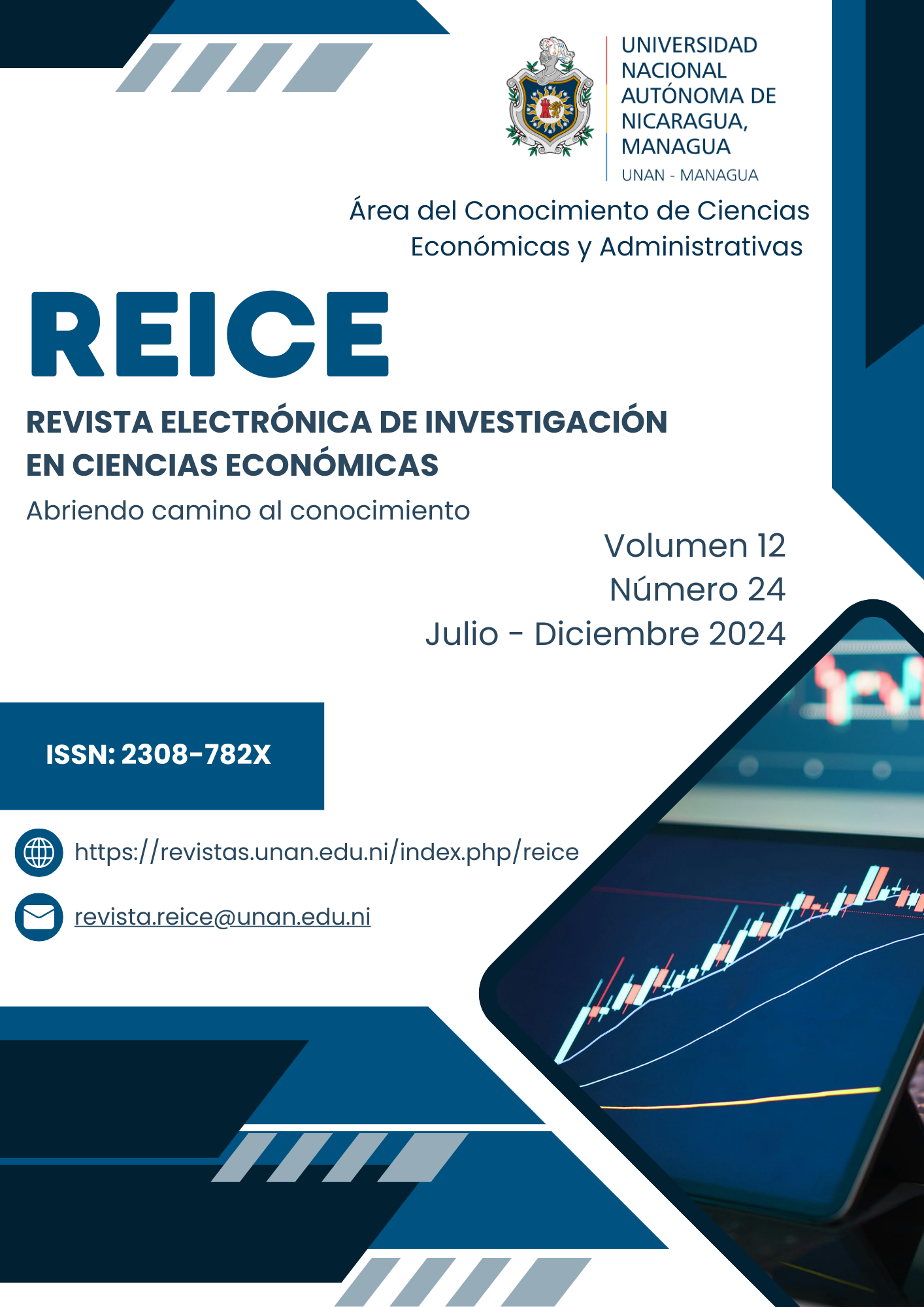Gender Aspects in ICT Managers Education at PUEB Czech Republic
DOI:
https://doi.org/10.5377/reice.v12i24.20094Keywords:
ICT managers, ICT management studies, gender aspect in ICT education, completion rateAbstract
The ongoing digitalisation of the economy places great emphasis ongreatly emphasizes the number and quality of ICT professionals. In addition, it is very important for master's degree programmes that the investment in individuals' education is effective, i.e., that they complete their studies successfully and enter the workforce after the standard period of study. The ICT sector has long suffered from a lack of women and the female factor in project teams. Does the gender factor play a role in these realities? Therefore, for the purposes of this article, we have selected the following three research questions from our long-term research, and formulate answers to them in this article:
- RQ1: Is the share of women in master's informatics degree programs growing over time?
- RQ2: Do women graduate from master's informatics study programs earlier than men?
- RQ3: Is the completion rate of women higher than that of men?
The source of the data is time series a time series of data on students at the Prague University of Economics and Business (PUEB) for the academic years 2013/2014-2022/2023. On the basis ofBased on the analysis, we can conclude that the proportion of women studying master's degree programmes is increasing over time (from 20 % in AY 2013/2014 to about 33 % in AY 2022/2023), as is the number of successful female graduates. The duration of the Master's degree is approximately 0.1 semester shorter for women than for men, and the completion rate is also higher for women for 8 percent points inby 8 percent points on average during the period 2013-2021.
Downloads
References
Ahmed, E. M., & Yang, T. K. (2017). High attrition rate determinants: case study of the malaysian ict sector. Journal of information & knowledge management, 16(3). 1750030. https://doi.org/10.1142/S0219649217500307
Czech Statistical Office. (2024). Average wages – 1. Quarter of 2024. https://csu.gov.cz/rychle-informace/average-wages-1-quarter-of-2024
Deloitte Insights. (2022). Hupfer, S., Mazumde, S., Bucaille, A., & Crossan G. Women in the tech industry: gaining ground, but facing new headwinds. Technology companies should renew their commitment to advancing gender diversity in tech as the pandemic recedes. https://www2.deloitte.com/us/en/insights/industry/
technology/technology-media-and-telecom-predictions/2022/statistics-show-women-in-technology-are-facing-new-headwinds.html
Doucek, P., Maryska, M., & Nedomova, L. (2023). ICT professionals in the czech business before and during pandemic era. In R. Němec, & L. Chytilová (Eds.), proceedings of the 15th international conference on strategic management and its support by information systems 2023 (pp. 44-51). VŠB – Technical university of ostrava. https://dokumenty.vsb.cz/docs/files/cs/e1c37442-9c5c-460d-b296-cefb7ecce285
European Commission. (2023). Commission opens calls to invest €42 million in digital skills. Press release. 23 November 2023, https://digital-strategy.ec.europa.eu/en/node/12196/printable/pdf
EU4Digital. (2021). 2030 digital compass: the european way for the digital decade. https://eufordigital.eu/library/2030-digital-compass-the-european-way-for-the-digital-decade/
Gwosc, C., Hauschildt, K., Wartenbergh-Cras, F., & Schirmer H. (2021). Social and economic conditions of student life in europe. Wbv publication. https://www.eurostudent.eu/download_files/documents/EUROSTUDENT_VII_Synopsis_of_Indicators.pdf
International Labour Organization. (2024). International classification of occupations (ISCO). https://ilostat.ilo.org/resources/concepts-and-definitions/classification-occupation/
Mačí, J. (2020). Studijní neúspěšnost vysokoškolských studentů na pozadí veřejných výdajů. Média iksž studentské práce. Institut komunikačních studií a žurnalistiky, fakulta sociálních věd. Univerzita karlova. https://media.fsv.cuni.cz/2020/01/29/studijni-neuspesnost-vysokoskolskych-studentu-pozadi-verejnych-vydaju/
Maryska, M., Doucek, P., & Nedomova, L. (2022). Time to degree and completion rate in graduate study programmes on faculty of informatics and statistics – prague university of economics and business. In L. Gómez Chova, A. López Martínez & J. Lees (Eds.), edulearn 22 proceedings – 14th international conference on education and new learning technologies (pp. 8538-8544). IATED Academy. https://doi.org/10.21125/edulearn.2022.2029
MSMT. (2016). Development of the study success rate at czech HEIs between 2003-2015. https://www.msmt.cz/uploads/odbor_30/TF/Analyticke_materialy/Vyvoj_studijni_uspesnosti_na_ceskych_VVS_mezi_lety_2003_2015.pdf
Messer, D., & Wolter, S. C. (2010). Time-to-degree and the business cycle. Education economics, 18(1), 111-123. https://doi.org/10.1080/09645290903102860
Nedomova, L., Maryska, M., & Doucek, P. (2017). Unequal wage of men and women in ict in the czech republic? Gender, technology and development, 21(1-2), 116-134. https://doi.org/10.1080/09718524.2017.1385317
Oskrdal, V., Pavlíček, A., & Jelínková, P. (2011). Processes, performance drivers and ICT tools in human resources management. Journal of competitiveness, 2011(2), 58-69. https://www.cjournal.cz/index.php?hid=clanek&bid=archiv&cid=58&cp=4
Shah, C. S., & Krishnan, S. (2024). ICT, gender inequality, and income inequality: a panel data analysis across countries. Information systems frontiers, 26, 709-727. https://doi.org/10.1007/s10796-023-10396-4
Šperková, L., & Nedomova, L. (2015). Are preconditions for economics study relevant to its graduation? In I. Krejčí, M. Flégl & M. Houška (Eds.), proceedings of the 12th international conference efficiency and responsibility in education 2015 (ERiE) (pp. 539-547). Czech university of life sciences prague. https://erie.pef.czu.cz/en/r-13630-proceedings-2015
Yue, H., & Fu, X. (2017). Rethinking graduation and time to degree: a fresh perspective. Research in higher education, 58(2), 184-213. https://doi.org/ 10.1007/s11162-016-9420-4
Zatonatska, T., Klapkiv, Y., Dluhopolskyi, O., & Fedirko, O. (2022). Forecasting of the employment rate in the EU ICT field. Comparative economic research. Central and eastern europe, 25(3), 7-25. https://doi.org/10.18778/1508-2008.25.19
Downloads
Published
Issue
Section
License
Copyright (c) 2024 Revista Electrónica de Investigación en Ciencias Económicas

This work is licensed under a Creative Commons Attribution-NonCommercial-ShareAlike 4.0 International License.

